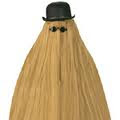Tuesday, June 18, 2013
Readers' Choice
It has suddenly struck me that I have left no room for people to create their own topics, ideas, questions, and interpretations outside of the topics provided. Since that is usually where the magic happens, consider this post that place. Please use this post to comment on your thoughts as you read the novel. Ask questions, begin discussions, provoke thoughts...your choice!!
Style Watch
There you go, Twilight fans! Don't say I never did anything for you. As you can see from Hurston's bio picture, this is a woman with style! Anyone who can pull off a hat with a feather is impressive in my book. But, now, speaking of Hurston's book, what do you notice about her writing style? As you may have noticed, there is a topic involving comparing Hurston's style to O'Brien's's style. This is a rather broad topic, so I'll try to help narrow it down a bit.
When addressing the style of each author, you may choose to analyze the diction, or word choice, of each. (Is the word choice formal or informal? Does the author write in a way that is imagistic and poetic or rather terse and straightforward?)
Other ideas to consider: Does the author use dialect? Long or short sentences? Lots of dialogue or not so much? Is there anything else that stands out about the author's style? What sort of atmosphere, tone, or mood is each writer able to create? How are the writers similar and different in these areas? Also, what impact or effect does the author's style have on the novel? Does the style help the readers to understand the time period or culture? Does the style tend to alienate readers or draw them in to the story? Does the narrator seem to have a particular bias or philosophy that spills onto the page?
*These are questions to think about for the essay topic. For this post, feel free to stick to Hurston's style and we'll save O'Brien for later. (Unless you've already read both novels...in which case I now appoint you Most Impressive Person of June. Anyone?)
Gender and Society
In Their Eyes Were Watching God, how does gender (society’s vision of what it means to be male and female) affect characters’ identities, decisions, and/or lives? In the society presented in the novel, what does it mean to be a man? a woman? Do the society's expectations of masculinity and femininity affect Janie's life in any significant ways? Are there any other characters that seem driven by societal expectations of gender (say, Joe Starks, for instance)? How has society's concept of gender roles changed over time? How has it not changed?
Symbols: Hair, Hair Everywhere! (and Hurricanes...)
As you know, symbolism occurs when a person, place, or thing (such as hair) represents itself and something beyond itself. Hair, strangely enough, is a symbol in this novel. Other symbols that Hurston uses are the weather/hurricane and the pear tree. The cool thing about symbolism is that you have to figure it out. Calling all literary sleuths: How (in the world) is hair a symbol in the novel? What about the pear tree and/or hurricane? What does the title refer to? How does this passage relate to a possible theme of the novel? Hmmmm...
What About Love?
What is love? When my technological skills advance, I will certainly add links to a multitude of quality pop and country songs (as well as rock ballads) that explore this very question. You may have a Heart ballad stuck in your head right now just from reading the title (or that might just be me, '80s lady...).
Again, Hurston and O'Brien have struck a major chord with all of human existence when they each attempt to present a vision of love within their novels' pages. One of the questions that seems to come up when attempting to define love (or really anything, for that matter) is: what is it not? How does Hurston define love? How does she show what it is not? Do you agree or disagree? We'd love to hear your thoughts...
Life is Just a Dream...Or Is It? Illusion/Dreams/Fantasy vs. Reality
Hurston and O'Brien both explore the notions of illusions and dreams vs. reality, which begs the question: what is the pupose of dreaming and imagination in life? Does the word "dreamer" have a negative or positive connotation to you? Can using one's imagination or vision make reality better? What happens when there is a huge disparity between the dream and the reality? Can one dream too much? Not enough? What are the consequences of each?
What are Janie's dreams in the novel? How closely matched to reality are they? Do Janie's dreams help or impede her life progress?
Subscribe to:
Comments (Atom)





